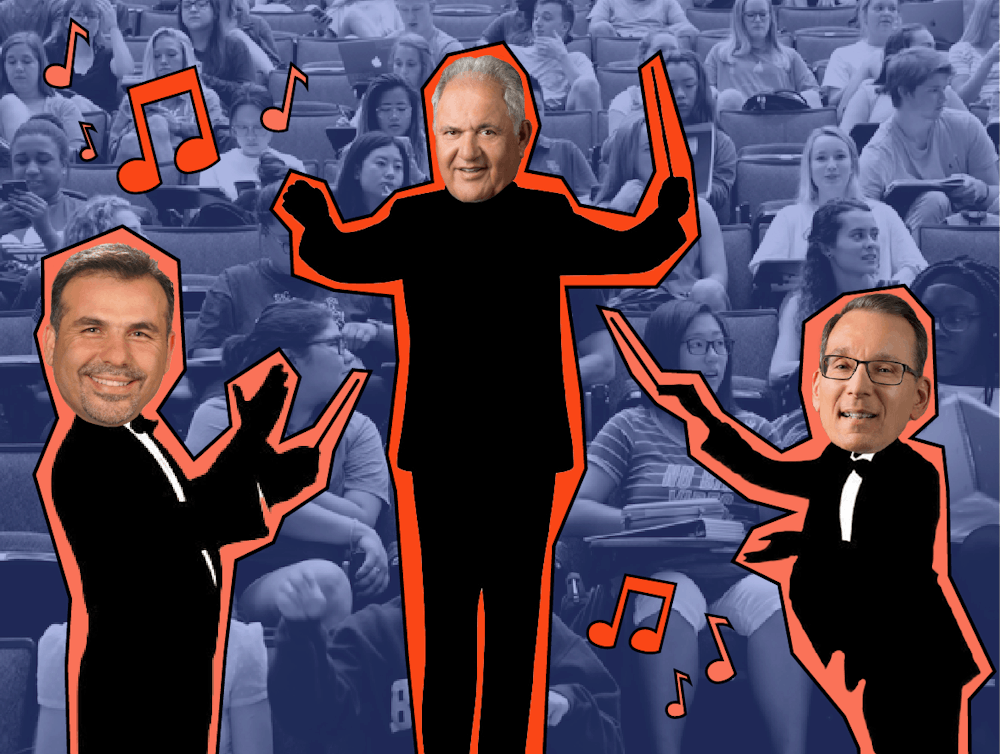The University of Florida has developed a reputation far from its Gator pride and excellent academics.
Aahan Thakkar, a 22-year-old UF sustainability senior, traveled to Chicago for a family event last weekend. When he told people he went to UF, he said it didn’t seem like the university is known for its great STEM programs or school pride anymore.
“[They say] ’How are things there? We know everything's really crazy politically,’” Thakkar said. “That's the reputation we have now.”
It shouldn’t be that way, he said.
While Orange and Blue pride may never die, and the university holds a No. 7 public school ranking, UF has also been on the map for reasons not every student is proud of. This summer introduced impactful changes to students and faculty, adding to an already complex administrative history.
Thakkar didn’t fully understand university politics until the end of his undergraduate career, but he wished he’d learned more about it during his first few years at UF. He felt like he would’ve been able to better advocate for himself and educate others, he said.
“ I just think being aware of the matter isn't enough anymore because we have to actually start engaging in actions,” he said, “or start having conversations or have a student body start talking to these people who are supposed to be teaching and representing us.”
The twists and turns of UF’s presidential search
UF hasn’t had a permanent president in a little over a year and it isn’t expecting one until 2026.
Former UF president Ben Sasse resigned unexpectedly in July 2024, citing concerns for his wife’s health. Sasse was criticized for his political ties and tripling his office’s spending during his UF presidency, and students protested his confirmation.
Kent Fuchs, who served as UF president for eight years before Sasse, stepped up as interim president after his resignation.
The UF Board of Trustees began its presidential search in January, and on May 4, the Presidential Search Advisory Committee selected Santa Ono as the search’s sole finalist.
His selection received mixed reactions from students and faculty. At the time of the announcement, Ono was the University of Michigan’s president and faced criticism for his actions toward pro-Palestine protesters and for shutting down the university’s DEI office.
Some students and faculty were skeptical of the secretive search. Before Sasse, previous searches produced several candidates instead of a sole finalist. Others thought Ono’s academic resume as former president of the University of British Columbia and the University of Cincinnati spoke for itself. They were hopeful an academic would be running UF, as opposed to a political figure.
The UF Board of Trustees confirmed Ono unanimously, and he received full support from Mori Hosseini. The board’s chair pushed for UF to achieve a higher national ranking after dropping its top-five public university ranking. He believed Ono would spearhead UF’s continued ascent.
For the first time in the board’s creation, the Florida Board of Governors rejected a candidate, stopping Ono in a 10-6 vote June 3, indicating a changing frontier for higher education.
In the month between Ono’s announcement as the sole finalist and the Board of Governors rejection, Ono received criticism from Florida Republicans for his former left-leaning values. After the vote, Sen. Rick Scott and Reps. Greg Steube and Byron Donalds asked for an open and transparent search process in a letter to the UF Board of Trustees June 18.
Alexander Peterson, a 20-year-old UF history and classics studies junior, said someone as qualified as Ono getting rejected for the presidency should warrant concern from the student body.
He believes it’s in students’ best interest to be aware of the inner workings of the presidential search process and the role Florida plays in it, he said.
“It was really disheartening to see Santa Ono get disapproved despite bending over backwards for the DeSantis administration,” Peterson said.
Nikki Fried, the chair of the Florida Democratic Party, tweeted that Casey DeSantis, the wife of Gov. Ron DeSantis, would become UF’s interim president weeks before Fuchs’ contract as interim president ended. Though UF officials said there was no truth to the rumor, Peterson said another political appointment would be the worst-case scenario for UF.
“A lot of students don't know just how bad the Sasse presidency was,” he said.
Two days before Fuchs’ contract was set to end, he chose to extend it until Sept. 1. UF officials said they expect to select a new interim president by then and plan to launch a new presidential search in the first quarter of 2026.
Even though he doesn’t agree with all of Fuchs’ choices, Peterson said he commends Fuchs’ willingness to come back repeatedly.
“ I feel a little bad for him,” he said. “He wanted to retire once they hired Sasse, or I assume so, and I feel like we kind of just keep bringing him back.”
Interim instability
Alejandro Pasten, a 19-year-old UF music education sophomore, said while it’s reassuring Fuchs will remain at UF a little while longer, it’s still concerning UF doesn’t have a solidified candidate to take on the presidential role.
“[It] generally makes me wonder whether or not they'll be prepared for when we do find and we do hire an actual president,” Pasten said.
Dozens of other positions across UF are currently filled by interim designees. Five of UF’s 16 colleges have interim deans, and departments like the Emerging Pathogens Institute and the Hamilton School of Classical and Civic Education are being run by interim directors.
Nick Kozlov, UF’s chief financial officer, and Joe Glover, the provost and executive vice president for academic affairs, are both interim leaders. Patrick Reakes was recently confirmed as Interim Dean of the George A. Smathers Libraries.
The number of interim positions doesn’t signal stability to Pasten. While he thinks the interim leaders are qualified, Pasten said he doesn’t think the setup will benefit UF in the long term.
“If a position's constantly changing and there's people going in and out, or people who are uncertain for how long they're staying in their position,” he said, “then that creates issues down the line long term.”
The constantly shifting leadership has an impact on employees and students who rely on them, Pasten said. The vacancies can benefit faculty who can move into administrative positions, he said, but students can be impacted by professors moving in, out and around departments.
“Whether or not you are confident in their ability, you definitely feel the transitionary phase,” he said.
UF called off its search for a dean of the College of Liberal Arts and Sciences after Gov. Ron DeSantis intervened in April.
Officials said they will hold off on conducting dean searches until the university has an official president, leaving departments in the care of temporary officials.
A summer of surprises
Since Ono’s rejection, the UF Board of Trustees has made several keynote decisions over the summer.
The board voted July 23 to hike out-of-state students’ tuition by 10% starting this Fall. Interim Chief Financial Officer Nick Kozlov said instructional costs have increased 25% over the last decade while out-of-state tuition has remained the same.
UF would still maintain the lowest tuition cost by more than $10,000 compared to the top 10 public universities in the country. The additional funds will offset instructional costs serving non-resident students.
Hosseini said the hike can impact some students more than others. The board approved his proposal to provide one-year waivers from tuition hikes to out-of-state students who demonstrate significant financial hardships.
The tuition hike is a result of a June 18 Florida Board of Governors vote, which allowed universities to increase non-resident fees by 10% headed into the Fall semester.
Jennifer Chistik, a 20-year-old UF accounting junior, said the hike can make attending UF inaccessible for students who can’t afford the new tuition cost.
“ Instead of encouraging education, [UF is] curbing a lot of the progress that it's made,” Chistik said.
She thinks UF’s recent decision to close the Office of Sustainability will also impact a lot of students, she added.
“It's going back a step instead of going forward,” she said.
As a sustainability student, Aahan Thakkar said it was heartbreaking to see UF shut the office down for what he believes are political reasons.
UF terminated the Office of Sustainability due to a 5% reduction in administrative expenses UF leadership initiated July 1. It closed for efficiency, a UF spokesperson said, and it has embedded sustainability into its operations.
Sustainability is extremely important right now, Thakkar said. It doesn’t make sense to cut an office for efficiency if its closure might recreate the waste the office worked to eliminate, he added.
“We should not be making science political,” Thakkar said.
He believes rolling back sustainability efforts is frustrating because the environment's not improving. Florida is impacted by climate change in several ways, including hurricanes, he said, and sustainability offers a framework for how to move forward.
He said operating without sustainability is like trying to build a house without a foundation.
“Right now, sustainability is a need,” he said. “It's not a want, it's not a request. It's a genuine need.”
On July 23, UF announced a full return to in-person work for faculty and staff. The sudden change took many by surprise, and it sparked discussions on how it will be implemented.
Employees expressed frustration and shock with the announcement, which gave staff and faculty 30 days to prepare for the return.
UF Spokesperson Cynthia Roldán Hernández wrote in an email the only exceptions are for staff and faculty whose assignments require them to be off campus. She added that UFHR is working with deans and vice presidents to ensure space is available or make alternate arrangements where necessary.
UF employees voiced concerns about how the return will impact their work-life balance, childcare and healthcare. Many also questioned whether current infrastructure can accommodate a full staff. Several people worried about parking, of which Roldán said there is plenty to accommodate staff and faculty.
“Arriving early greatly improves employees’ ability to find a parking spot close to their campus work location,” Roldán wrote.
UF Spokesperson Steve Orlando confirmed UF’s Chief Information Officer Elias Eldayrie decided to end hybrid work arrangements for UFIT employees in June, which took effect Aug. 11.
A word of advice
Lucas Nadeau, a 20-year-old student senator and UF political science junior, said it’s important to keep up with university administration because it has a lot of unseen influence over students.
The Board of Trustees is one of the most unappreciated parts of the administration, he said, but it heavily influences the bills and resolutions student government can get passed.
“Obviously we're students, but whether or not UF administration does actually carry out our resolution ideas is up to them,” Nadeau said.
Student Body President Blake Cox is a member of the Board of Trustees, and Nadeau said his role is to make sure student voices are heard by the UF administration.
The Student Body President is also a member of the presidential search committee, he said.
Maddox McGrath, a 19-year-old UF mechanical engineering junior, said the decisions UF administration makes can directly or indirectly “affect you and affect your education.”
The out-of-state student tuition hike and program cuts make UF feel like a different university than the one he originally enrolled in, he said. The administration’s decisions seem to be rooted in politics, he added, and he doesn’t think it’s fitting for a university that says it cares about its students.
“It's important to keep up so that you can be informed and fight back on things that need to be fought back on,” McGrath said.
Contact Maria Avlonitis at mavlonitis@alligator.org. Follow her on X @MariaAvlonitis.

Maria is the Fall 2025 university editor of the Alligator. She previously worked as the university administration reporter Summer 2025. Maria enjoys walking her dog, and on the rare occassion she has free time, she loves attempting to garden and salsa dancing.






